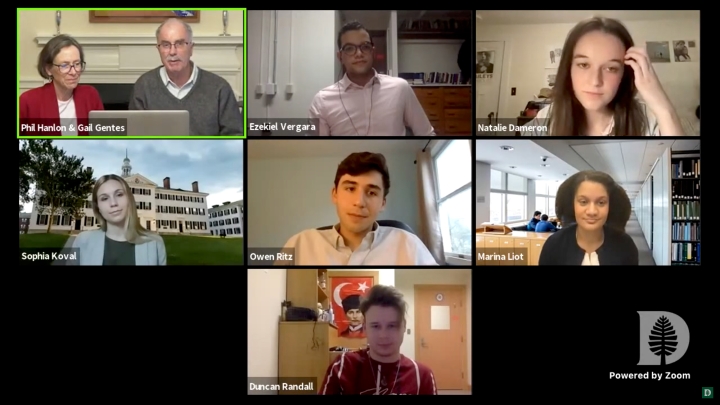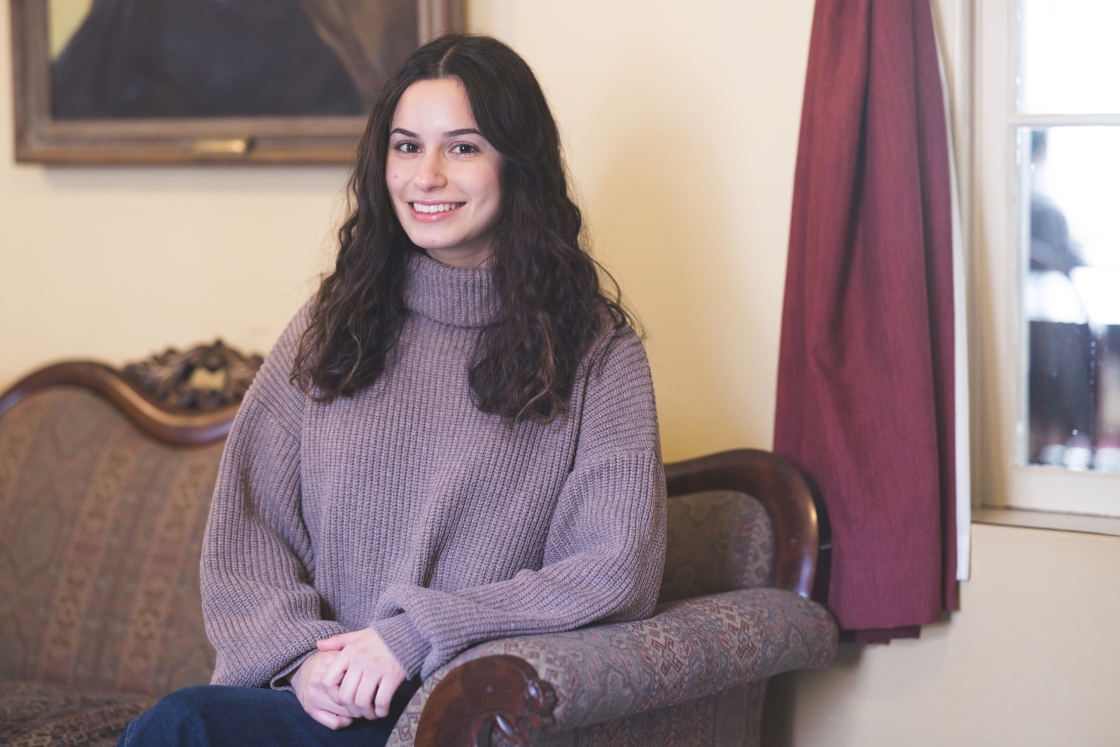See videos of each of the research presentations.
“Undergraduate research is among the most powerful experiential learning opportunities we provide on our campus,” said President Philip J. Hanlon ’77, as he and his wife, Gail Gentes, welcomed viewers to a virtual presentation of senior honors thesis projects, which began May 4.
“It involves asking the right questions, working independently and in teams, being resilient and resourceful in the face of setbacks, making connections, building relationships, and learning to draw meaningful conclusions and communicating those conclusions effectively,” President Hanlon said.
The work highlights the close connection between faculty and students that is so distinctive at Dartmouth, Gentes added.
“This is Dartmouth at its best,” she said.
In the online symposium, taking place over four days this month and open (virtually) to the public, students explain their honors thesis research and answer questions from Hanlon and Gentes. In the opening session, undergraduate researchers summarized their work in engineering, economics, chemistry, Russian history, and anthropology.
Two presenters took aim at climate change. Jackson Danis ’21, in “Design and Validation of Affordable Heat Flux Sensing for Optimized Actuation of Green Building Elements,” measured the performance of heat sensors which, he said, if used more efficiently in window shades for passive solar structures, could significantly reduce our carbon footprint.
Simon Oster ’21 studied “The Effective Thermal Conductivity of Polar Firn.” Partially compacted glacial snow, firn yields clues about our future, he said. “It’s crucial to know the rate at which ice sheets are melting to help us prepare for what may come.”
Closer to home, with “Paychecks for Public Companies? An Econometric Analysis of Public Firm Borrowers of the Paycheck Protection Program,” Kira Koehler ’21 examined the impact of the $659 billion Paycheck Protection Program (PPP), part of the $2.2 trillion CARES Act approved by Congress early in the COVID-19 pandemic. Koehler learned that “PPP helped firms on Main Street—the small ones that were really struggling to keep their employees on payroll.” But the loans were “less consequential,” she found, for large, public corporations, some of which, despite the assistance, failed to keep employees on the job.
Liam Locke ’21, author of “Development of NMR-Compatible NEMO Constructs for Inhibitor Screening,” focused on aspects of the structure of proteins, which is key to developing effective pharmaceutical drugs.
The final two theses were more historical than scientific in scope. Roxanne Holden ’21 compared Cold War spy craft in the U.S. and the U.S.S.R. Interviewing experts, and watching films, Holden found, in “Spy Cultures: A Comparative Analysis of Soviet and American Intelligence,” that while the U.S. depended heavily on technology, the Soviets relied more heavily on human spies. Both countries, she said, “blurred the lines between entertainment and propaganda.”
The final presentation, by Mary Joy ’21, posed a question about the evolution of species by natural selection: “Do Monkeys and Apes Climb the Same Way? A Kinematic Analysis of the Upper Limb During Vertical Climbing.” By studying the bones of monkeys and apes, “we can add to the story of humanity,” Joy said.
“When you see someone who looks differently and thinks differently from you, think about this,” she concluded. “You and I and they all carry the same history: the marks of the same evolutionary struggle to survive in an adverse world, written deep in the canvas of our bones.”
The senior honors thesis presentations are available to watch online. In addition to the May 4 presenters, the student researchers are:
May 5:
- Sophia Koval, Biological Sciences
- Natalie Dameron, Film and Media Studies
- Marina Liot, Government
- Owen Ritz, History
- Duncan Randall, Middle Eastern Studies
- Ezekiel Vergara, Government
May 10:
- Steven Hadley, French and Italian
- Cecilia Morin, Anthropology,
- Ameena Razzaque, Geography
- Themistoklis Haris, Computer Science
- Arun Maganti, Economics
- Leah Casey, English and Creative Writing
May 12
- Faven Woldetatyos, Government
- Shannon Sartain, Earth Sciences
- Samuel Morton, Computer Science
- Nicholas Feffer, Computer Science
- George Geier, Earth Sciences
- Erin Dickert, Biological Sciences


